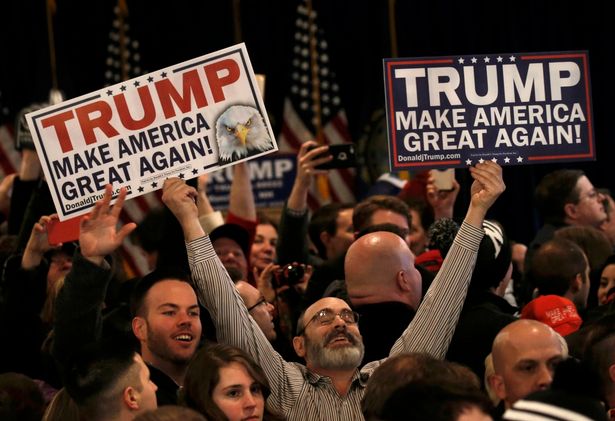By now all of you have heard or seen Trump’s slogan of “Make America Great Again.” The slogan is a timely attempt to rally the still-patriotic contingent of U.S. citizens who hold to some level of American exceptionalism.
But since first hearing the slogan I’ve had a nagging thought lingering in my head: Maybe America never was “great”?
Trump, I believe, uses the slogan to hearken back to the Reagan Administration, when he said that people still “felt really proud” to be Americans. (By the way, Reagan used the same slogan for his 1980 presidential campaign.)
But for many Americans, the country’s “greatness” primarily lies in the earliest years of its founding.
We are the children of Protestant historiography, and as a result, have a tendency to view history as a pattern of decline from inspired beginnings. In the traditional Protestant understanding, Christianity was in its purest form in the first century after Jesus Christ’s death, and then gradually degenerated in the following centuries as theology became more philosophical and churches and worship became more ornate—only to be rediscovered with the Reformation in the 16th century.
Analogously, in the typical (Protestant) view, the idea of America was most fully realized in the “apostolic age” of the Founding Fathers, but has since then become sullied by misinterpretations of the Constitution and the Founders’ original “intent.”
However, there is another way of looking at things when it comes to history. In his Essay on the Development of Christian Doctrine, John Henry Newman opposed historiographies that glorify what came earlier:
“It is indeed sometimes said that the stream is clearest near the spring. Whatever use may fairly be made of this image, it does not apply to the history of a philosophy or belief, which on the contrary is more equable, and purer, and stronger, when its bed has become deep, and broad, and full.”
Listen, I think most of us should be able to admit that the Founding Fathers were impressive individuals. They were well-educated. They created perhaps the best realization of the dominant Enlightenment philosophies of the day. And America’s democratic principles have led to a high standard of living for a large percentage of its population.
But there were also some chinks in America’s armor that were there from the beginning.
As Notre Dame professor Patrick Deneen and others have argued, the classical liberalism on which America was founded is unsustainable. It’s difficult to maintain unity among people based primarily on abstract, lowest-common-denominator values such as “freedom” and “equality”. I think we’re currently witnessing what happens when radically different interpretations of these values eventually clash with each other.
In addition, the individualism that is a central tenet of classical liberalism does not place enough importance on history, tradition, and the small communities (such as families and churches) responsible for forming people in virtue. Over time, this individualism logically results in a nation of people who live primarily for their own interests, who no longer care about their country’s past, and who need an increasingly powerful government and law enforcement to rein in the desires of other individuals.
The Founding Fathers may have created a promising framework for diverse peoples to coexist in a nation in an imperfect world. But maybe, just maybe, America has never quite realized its “greatness.”?
Perhaps some of the seeds of America are great, but after 240 years, they may still need further tending.
Image: M. Segar/Reuters
















Leave a Comment
Your email address will not be published. Required fields are marked with *